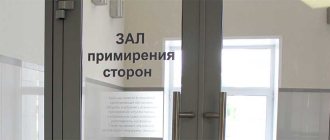Self-service stores were originally created for the convenience of customers - you take what you like, and not what the seller slips you. In addition, there is a marketing ploy here - when the product is available, people buy more.
But such a system led to massive and regular thefts due to the same availability. Today we will tell you what the consequences of theft of up to 1000 rubles are.
Until a penalty of 90 days, the offer is carried out only in a qualified certificate. If this offer is exceeded, it can also be found in a simple certificate. If the convicted person is caught shoplifting again, it is very likely that freedom will be imposed. In addition to criminal measures taken by the judiciary, the affected transactions usually impose a one-year ban on the shop floor.
Shoplifting: Bad Cards When Buying Crime
The poor cards are those who are punished by the so-called "criminalization of procurement", since the prosecutor's office has a number of criminal offenses, such as a crime, since the accused enters the business for a specific purpose. This is mainly about combating the drug trade, which supports their livelihood and drug consumption through shoplifting.
What circumstances must be recorded?
Facts must be recorded as you:
- they approached the goods and took them;
- hid the goods in a bag or clothes;
- moved around the store with hidden goods;
- went through the checkout and did not pay for the goods.
Confirmation of the commission of these actions will be recordings from CCTV cameras or testimony of witnesses.
If you are forcibly detained, demanded to show the contents of bags, packages, pockets, prevented from leaving the store freely and insisted on a search (personal or things on you), you should know that all of the above actions towards you will be unlawful. The maximum that the security staff can do is detain you until the police arrive to confirm the fact of theft.
In accordance with Art. 158 of the Criminal Code of the Russian Federation, theft is the secret theft of someone else’s property. If the theft occurred in a store, the theft will be considered completed from the moment when the person, having hidden the goods in personal belongings, took it past the cash register without paying the price. However, if the amount stolen from a supermarket does not exceed 1,000 rubles, this illegal action is an administrative offense and is classified as petty theft (Article 7.27 of the Code of Administrative Offenses of the Russian Federation).
if the clothes cost more than 2000 rubles
If the stolen clothes cost more than 2,000 rubles, a much more serious liability comes—criminal liability.
Criminal liability for clothing theft
For the theft of clothing worth more than 2,000 rubles, the following liability is provided:
- a fine of up to eighty thousand rubles or in the amount of the wages or other income of the convicted person for a period of up to six months;
- compulsory work for a period of up to three hundred and sixty hours;
- or correctional labor for up to one year;
- or restriction of freedom for a term of up to two years;
- or forced labor for up to two years;
- or arrest for up to four months;
- or imprisonment for a term of up to two years.
Legislative regulation
1. Theft, that is, the secret theft of someone else’s property, -
shall be punishable by a fine in the amount of up to eighty thousand rubles, or in the amount of the wages or other income of the convicted person for a period of up to six months, or by compulsory labor for a term of up to three hundred sixty hours, or by corrective labor for a term of up to one year, or by restriction of liberty for a term of up to two years. , or forced labor for a term of up to two years, or arrest for a term of up to four months, or imprisonment for a term of up to two years. (as amended by Federal Law dated December 7, 2011 N 420-FZ)
2. Theft committed:
a) by a group of persons by prior conspiracy; b) with illegal entry into the premises or other storage; c) causing significant damage to a citizen; d) from clothes, bags or other hand luggage that were with the victim -
shall be punishable by a fine in the amount of up to two hundred thousand rubles, or in the amount of the wages or other income of the convicted person for a period of up to eighteen months, or by compulsory labor for a term of up to four hundred eighty hours, or by corrective labor for a term of up to two years, or by forced labor for a term of up to five years. with restriction of freedom for a term of up to one year or without it, or imprisonment for a term of up to five years with restriction of freedom for a term of up to one year or without it. (as amended by Federal Law dated December 7, 2011 N 420-FZ)
3. Theft committed:
a) with illegal entry into a home; b) from an oil pipeline, oil product pipeline, gas pipeline; c) on a large scale, -
You can almost always return an item!
The main thing is to know the procedure and use the law correctly. Get information for free from lawyers via chat (bottom right ↘️)
shall be punishable by a fine in the amount of one hundred thousand to five hundred thousand rubles, or in the amount of the wages or other income of the convicted person for a period of one to three years, or by forced labor for a term of up to five years with or without restriction of freedom for a term of up to one and a half years, or imprisonment for a term of up to six years with a fine in the amount of up to eighty thousand rubles or in the amount of the wages or other income of the convicted person for a period of up to six months or without it and with restriction of freedom for a term of up to one and a half years or without it. (as amended by Federal Laws dated December 27, 2009 N 377-FZ, dated March 7, 2011 N 26-FZ, dated December 7, 2011 N 420-FZ) (part three as amended by Federal Law dated December 30, 2006 N 283-FZ)
4. Theft committed:
a) an organized group; b) on an especially large scale, -
shall be punishable by imprisonment for a term of up to ten years with or without a fine in the amount of up to one million rubles or in the amount of the wages or other income of the convicted person for a period of up to five years and with or without restriction of freedom for a term of up to two years. (as amended by Federal Laws dated December 27, 2009 N 377-FZ, dated March 7, 2011 N 26-FZ)
notes. 1. Theft in the Articles of this Code means the illegal gratuitous seizure and (or) conversion of someone else’s property for the benefit of the perpetrator or other persons, committed for mercenary purposes, causing damage to the owner or other holder of this property.
2. Significant damage to a citizen in the Articles of this chapter, with the exception of part five of Article 159, is determined taking into account his property status, but cannot be less than five thousand rubles. (Clause 2 as amended by Federal Law dated 07/03/2016 N 323-FZ)
3. In the Articles of this chapter, premises are understood as buildings and structures, regardless of the form of ownership, intended for the temporary residence of people or the placement of material assets for production or other official purposes.
In the Articles of this chapter, storage means utility premises separated from residential buildings, areas of territory, pipelines, and other structures, regardless of the form of ownership, that are intended for permanent or temporary storage of material assets. (as amended by Federal Law dated December 30, 2006 N 283-FZ)
4. Large size in the Articles of this chapter, with the exception of parts six and seven of Article 159, Articles 159.1, 159.3, 159.5 and 159.6, is recognized as the value of property exceeding two hundred and fifty thousand rubles, and especially large - one million rubles.
What are the rights of police officers?
If store security staff insist on searching you personally or searching your belongings, forcibly detaining you, or demanding that you pay a fine on the spot, you must call the police yourself. After the police arrive, you will be asked to voluntarily hand over the goods you are suspected of stealing. It should be borne in mind that the voluntary release of goods in the case where a person is actually convicted of theft (petty theft) does not exempt from possible adverse consequences in the form of legal liability. In case of refusal, police officers in the manner provided for in Art. 27.7 of the Code of Administrative Offenses of the Russian Federation, you have the right to conduct a personal search of things on you (in some cases, a personal search may be required).
The procedure for carrying them out is similar. The search is carried out by police officers, an appropriate protocol is drawn up, which records the progress and results of this procedural action. When conducting an inspection of things, two witnesses must be present or video recording must be used. The requirements for conducting a personal search are regulated more strictly: this type of search is carried out by an employee of the same gender as the person being searched, in addition, witnesses must be of the same gender. Failure to comply with the procedure by police officers may subsequently lead to the recognition of the search as illegal, and, therefore, the very discovery of a stolen item from the point of view of the law will not have legal force, despite the obviousness of what is happening.
If a stolen product is discovered, depending on its value (whether it exceeds 1,000 rubles or not), the law provides for various negative consequences for the person who stole it. In any case, the buyer who stole or forgot to pay for the goods should be prepared for a long and unpleasant investigation into this fact.
What to do if a minor is accused?
Store security may also detain a minor child if they are suspected of theft. Supermarket employees must immediately report the fact of his detention to the police. Once police officers arrive at the supermarket, the subsequent procedure is largely similar to that described above. Parents (other legal representatives) of a minor have the right to be present when the minor is interviewed. Notification by the police of legal representatives is essential to ensure the protection of the rights and legitimate interests of minors.
Criminal liability for theft is established from the age of 14, but if this act falls under the elements of petty theft, then the minor who committed it can be brought to administrative responsibility only from the age of 16. At the same time, it is necessary to understand that failure to be held accountable due to not reaching the legal age does not mean that the child and parents will “get away with anything.” Taking into account the circumstances of the case, the child may be registered as a juvenile delinquent, and the parents may be held accountable for improperly fulfilling the responsibilities of raising him.
What to do if your rights are violated?
If you believe that your rights or legitimate interests were violated by supermarket employees, you can file a claim in court for compensation for moral damage. If supermarket employees caused you material harm (for example, your clothes were damaged or soiled, you missed a business meeting or were late for work), and in the end it turned out that you did not commit any illegal actions, then you can also demand compensation for these losses .
In addition, if illegal actions were committed by employees of a private security company servicing the store, and not by employees of the supermarket (who often have absolutely nothing to do with private security activities, despite the inscription “Security” on the form), you have the right to contact the internal affairs authorities with complaint. This complaint is fraught with an unscheduled inspection for a private security company, as a result of which both the security guards themselves and the company may be held accountable.
In conclusion, it should be noted that the strengthening of the fight against theft may also affect law-abiding supermarket visitors, so you should know your rights and not be afraid to defend them.
Child theft: why does it happen in good families?
For example, this girl who dreamed of a dress and a phone, but was afraid to even tell her mother about it, preferring to rummage through her pockets in the locker room. After discussing all the options with her mother, the girl began to receive pocket money steadily, and also had the opportunity to freely discuss what she wanted and what she dreamed of, things got better.
One girl was stealing all sorts of souvenirs from school, my mother was alarmed, they came to see me. We played a game with her - she chose 5 items for herself, I also chose, we started exchanging with each other, and then I simply stole the most valuable one. We discussed with the girl how she felt about this. We talked about the dangers of theft, that there is shame, fear of exposure. And only then about what ways there are to get what you want if you talk and negotiate.
With the boy who stole to treat his friends in order to attract attention, they worked out how else he could make friends, how to prove himself in the company. As soon as it starts to work out, there is no longer any need to steal.
One more example. There was a preferred child in the family - a boy, more successful, his mother encouraged him, noticed him, but rather not her daughter. She began to steal something every now and then, trying to attract attention to herself; she did not understand how else to fulfill this desire. When we discussed it with my mother, it became obvious to her that the child perceived the situation in the family as injustice. It also happens when considering what is happening that parents understand that the child is being ignored, work or marital relationships are being prioritized. This creates the basis for theft. And then, of course, we work more with the parents themselves.
Separately, it is worth mentioning situations when it turns out that a child is stealing money from parents or grandparents. Because of strong feelings of anger, distrust and shame for the child, parents become indignant, and then it becomes even more difficult to clarify, but it’s important to talk, to find out whether the teenager may be in trouble, it happens that they extort money in the yard or at school.”
Oksana Makarova, PDN inspector: “I would advise parents to raise their children and pay more attention to them. Our parents are so busy now, they work from dawn to dusk. It is important to keep children occupied, sections, clubs of some kind, so that the child has interests, so that children do what they need to do, and not invent something for themselves... Younger schoolchildren are almost always under supervision, they are not even allowed out of school so easily. And older children begin to wander around alone, companies appear, and this is how it all begins.
It is, of course, important for parents to explain to their child that taking someone else’s property from a classmate or in a store is not just a prank, it is a crime for which there is liability. By the way, if a child starts stealing money from his mother or grandmother’s wallet, we also need to talk about this, because this is also someone else’s property.”
Olga Sergeeva, psychologist: “When parents raise a child, they instill in him the concept of “friend or foe.” Almost all children, until they have this understanding, bring something home. And around the age of 6-7 years, a child, even if he really wants something, begins to restrain himself and is able to do it, for fear of violating the ban.
It is imperative to protect the child’s right to own his property (toys, things) in front of other children, even brothers and sisters. Otherwise, you end up with double morality; you can’t teach respect for other people’s property that way.
A smart parent is attentive, notices what is foreign and finds out where it came from. Offers to return the item or compensate for the damage, reminiscent of the rule “you can’t take someone else’s.” It is worth remembering that excessive shaming has the opposite effect - the child becomes insensitive to shame. If an episode of theft has occurred, in no case should you hush it up or put the brakes on it, but you can’t get by with just “that’s not possible”; you need to understand what was driving the child, what the need was, and rebuild, first of all, your own parental attitude. If it’s difficult to understand, come to a psychologist; usually 1-2 consultations are enough to understand the reasons for the child’s behavior and figure out how to help him.”








